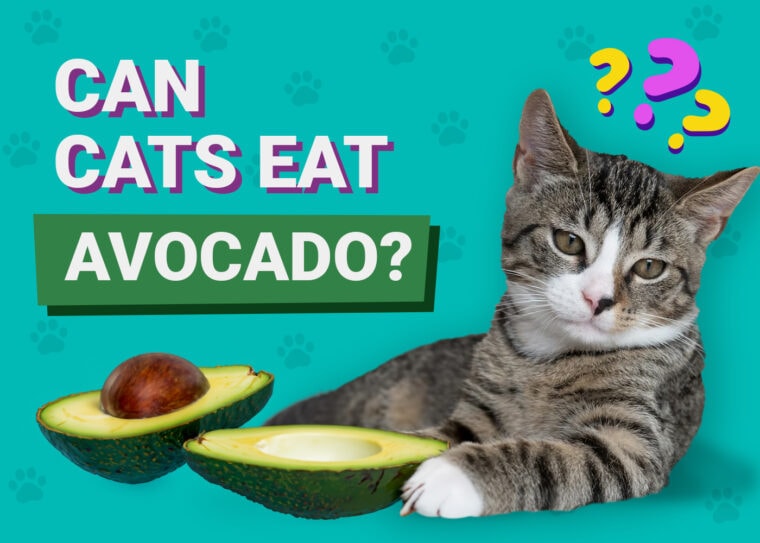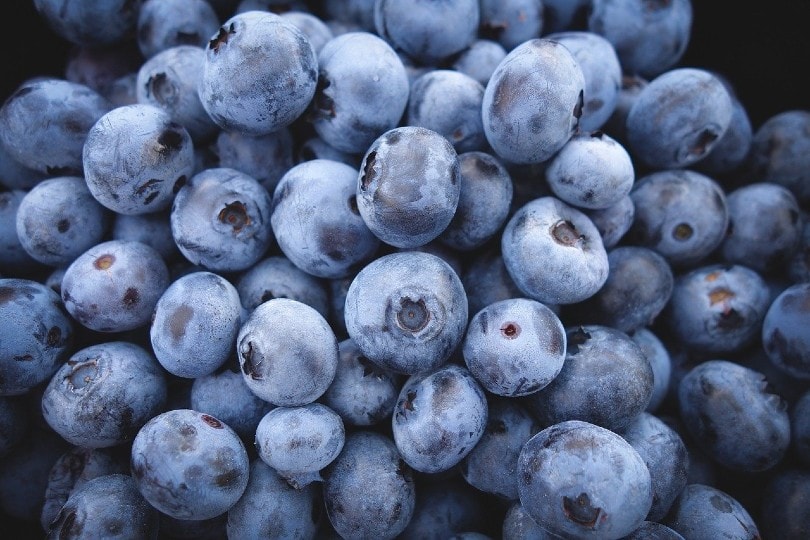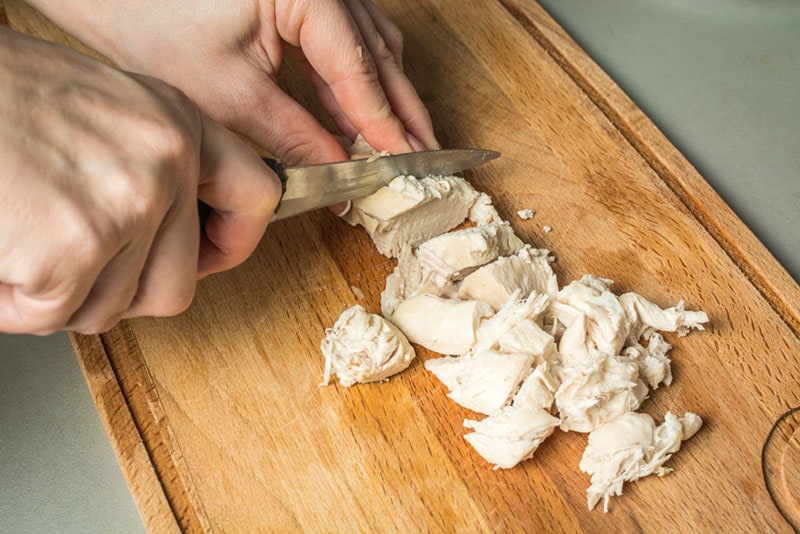
Click to Skip Ahead
Avocado is a superfood, so it must be super to feed cats, right? Wrong. Actually, the most accurate answer is that it’s complicated. While the avocado flesh isn’t harmful to cats, certain parts of the avocado, like the pit and skin, can be. While sharing a bit of your favorite superfood with your furry bestie won’t poison them, it’s generally not something you want to do. So, to answer your question, cats can eat avocados but probably shouldn’t because there are some serious risks if they eat the wrong type.
A Cat’s Diet: What You Need to Know
Cats are obligate carnivores. They require and thrive on a diet primarily composed of meat. Their bodies aren’t designed to digest plant-based foods like avocados as efficiently as they do meat. Cats do eat some plants in the wild, but in moderation and usually only as a source of fiber to aid in digestion.

Avocado: A Superfood for Humans, But What About Cats?
While avocados are packed with beneficial nutrients for humans, they don’t necessarily offer the same benefits for our feline friends. Cats require specific nutrients found in only one place – animal tissues. These include taurine, arachidonic acid, vitamin A, and vitamin B12, which avocados lack.
Avocados contain healthy fats and fibers. These can contribute to a shiny coat and digestive health in small amounts. However, avocados also have potential risks. The pit, skin, and leaves contain persin, a toxin that can cause vomiting and diarrhea in cats. The high-fat content can also lead to obesity if fed in large amounts. So, it’s important to only feed your cat the flesh of the avocado and avoid the pit, skin, and leaves. But, even the flesh is not good for cats in high amounts.

What Happens When Your Cat Eats Too Much Avocado?
Digestive Issues
Cats are carnivorous animals whose digestive systems are not designed to handle large amounts of plant-based foods. Overfeeding your cat with avocado can lead to digestive issues, including vomiting and diarrhea. Basically, your favorite rug is in danger. Why do cats only throw up on the nice rug?
Weight Gain and Obesity

Avocados are high in fat. While these are healthy fats beneficial for humans, they may lead to weight gain and obesity in cats if consumed in excess, leading to a host of other health problems. Everyone loves a chonky cat, but a healthy cat is top priority.
Potential for Avocado Poisoning
While rare, excessive consumption of avocado can lead to avocado poisoning in cats, thanks to the presence of a toxin called persin in the fruit’s skin and pit. The odds of toxicity depend on the variety of avocado consumed, with some being more toxic than others.
For this reason, it’s best to avoid feeding your cat any and all types of avocados. Toxicity can begin to show signs within 24 hours of ingestion and may include vomiting, diarrhea, or loss of appetite.
Safer Alternatives to Avocado
Commercially Prepared Cat Foods
Cat foods are nutritionally balanced to meet your cat’s dietary needs. These are safer alternatives to feeding your cat avocados. Most brands contain high amounts of animal proteins, as well as other nutrients cats require. When you feed a healthy diet, there’s really no need for treats, but… nobody wants to live in a world with no treats.
Safe Fruits and Vegetables
While cats are obligate carnivores, some fruits and vegetables can be safely incorporated into their diet. However, these should be given in moderation and should not replace their regular diet of high-quality cat food. Fruits and vegetables that are safe for cats to consume in moderation include blueberries, bananas, and peeled apples. Make sure they’re ripe, washed, and in easy-to-chew pieces. It’s also a good idea to supervise your cat while feeding.

Homemade Cat Treats
Making homemade cat treats can be an enjoyable and rewarding activity, allowing you to offer your pet snacks that are not only tasty, but also healthy and safe. There are numerous simple and easy-to-prepare options that your cat will love.
Catnip and Cat Grass
Catnip is an herb from the mint family that most cats find irresistible. You can grow it in your garden or buy it dried from a pet store. Sprinkle a little on their favorite toy or scratching post and watch them enjoy it.
Cat grass (wheatgrass) can be a great snack for your feline friend. It aids digestion and provides them with important nutrients. You can grow it in small pots and let your cat chew directly from it.
Cooked, Unseasoned Chicken Bits
Many cats love the taste of chicken. Cook a plain chicken breast, let it cool, then cut it into bite-sized pieces. These can be stored in an airtight container in the fridge for a few days. You can serve them as a treat straight from the fridge.

Fish Treats
Cats often enjoy fish. Small portions of cooked salmon or tuna can make for a delicious treat. Make sure to remove all bones and avoid using any kind of seasoning.
Remember, while these treats can add variety to your cat’s diet, they should not replace a complete and balanced cat food. Always consult with your vet before introducing new foods into your cat’s diet.
When to See Your Vet
It’s important to closely monitor your cat’s behavior and condition closely, especially after introducing new foods into their diet. If you notice signs of illness, such as lethargy, loss of appetite, or changes in behavior, it’s time to see the vet.
Regular vet check-ups are crucial for early detection of potential health issues. Even if your cat appears healthy, regular check-ups can help ensure they stay that way. In case of an emergency, such as suspected avocado poisoning, take your cat to the vet immediately. Quick action can make all the difference in your pet’s recovery.
Knowing exactly what your feline companion can and cannot eat will help you become the best pet parent. Recognizing that not all cat bowls are equal is also key! The Hepper NomNom Cat Bowl sets itself apart from traditional options by catering to the specific needs of cats. The innovative design offers whisker relief via shallow dishes and promotes digestion with a slight bowl elevation. Find out if the Hepper NomNom is right for your cat by clicking here.
At Pet Keen, we’ve admired Hepper for many years and decided to take a controlling ownership interest so that we could benefit from the outstanding designs of this cool cat company!
Conclusion
Wrapping up, introducing new foods to your cat’s diet can be an exciting change. However, it’s important to remember that not all foods are safe for cats. While some cats may enjoy the creamy texture and taste of avocado flesh, others might not. As with any new food, it should be introduced slowly and in moderation, and cats should never eat avocado pits, seeds, or leaves. Always consult with your vet before adding something new to your cat’s diet.
Featured Image Credit: jmexclusives, Pixabay











